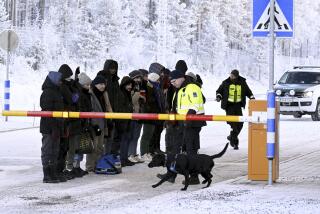Terminal Confusion : Moscow Airports Offer Even More Frustration
- Share via
MOSCOW — On Fridays and Sundays at thronged Sheremetyevo Airport, police and emergency medical crews have their work cut out for them.
“Three of our passengers fainted and had to be taken to the infirmary because the passport control lines were so long and the hall was so crowded,” Hans Erhold, the Swissair station manager for Sheremetyevo, said of a recent Sunday.
The obstacle for departing passengers is customs, which is at its worst every Friday. “I always leave myself at least two hours and I’ve never missed a flight, but this time I really panicked,” said Michelle Nelson, a law-firm employee who has traveled in and out of Russia for three years. “I couldn’t even see where the line was to get up to customs. After a while, I just lost it and started pushing, like everyone else.”
As millions of Russians have joined the waves of business travelers on flights to and from Moscow, traffic volumes have exploded while funds for the government-owned airports have dwindled with the devastated economy.
Despite the advance of capitalism elsewhere in Moscow and dramatic improvements in personal freedoms, including the right to travel, the Russian capital’s three international airports remain a picture of Soviet-era bureaucracy and a daunting hurdle for anyone trying to enter or leave the country.
“Bedlam is probably too strong a word, but we are aware of our shortcomings,” concedes Oleg N. Ivchenko, Sheremetyevo’s deputy director. “Customs is our bottleneck. We realize that the current system is totally illogical. A passenger shouldn’t have to pass through customs before he even checks in for his flight. But to do it otherwise, we would have to rebuild the entire terminal.”
Foreign investors have little interest in pitching in to renovate the overwhelmed, crumbling state facilities, and powerful trade unions representing the thousands of customs workers and border guards assigned to the airports have been fighting revision for fear many will lose their jobs.
So those who were once expected to shake out every T-shirt and count every bank note now spend that time staring at X-ray monitors and quibbling over the manner in which the pointless currency declarations are filled out.
Especially in summer, when dozens of vacation charters worsen the crowds, arriving travelers often cannot make their way through the sea of other passengers, baggage and well-wishers packed around the sole entrance to the customs area.
“The border guards are the worst. Just watch them some time. They aren’t checking computers for wanted criminals, they’re staring at the ceiling or the floor,” complained Swissair’s Erhold. “It’s as if they’ve been told to slow things up as much as possible.”
Air carriers forced to subject their clients to the transit ordeals are among the airports’ most bitter critics.
“The situation is just horrible,” said Arthur R. Tsomaya, president of AJT Air International, which operates charters to sunny European spots. “What kind of mood is the passenger in when he finally arrives on board our plane after hours of torture? He can’t even notice the quality of our cabin service because he’s so furious.”
At Vnukovo and Domodedovo airports as well as at Sheremetyevo, baggage carts are in short supply and under the control of a corrupt porters’ group that buys them at the official $2 rate to resell for upward of $20. Toilets, if not locked, are unspeakable at all three airports, and only Sheremetyevo has any semblance of food concessions or duty-free shopping. The federal government, meanwhile, exudes little enthusiasm for transferring the airports to private hands.
“The airports are comfortable government monopolies that make money from the airlines forced to use them,” said Alexander A. Khrenov, a senior official of Vnukovo Airlines, a separate corporate entity from the airport. “But for us, getting a decent terminal is a matter of life and death.”
More to Read
Sign up for Essential California
The most important California stories and recommendations in your inbox every morning.
You may occasionally receive promotional content from the Los Angeles Times.














